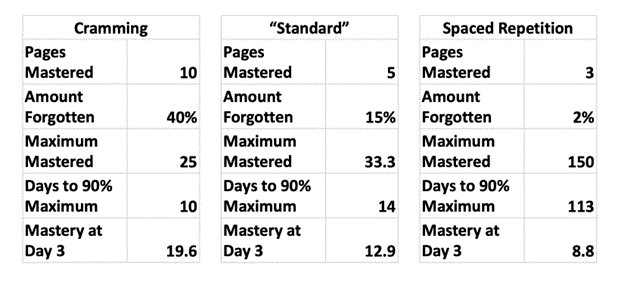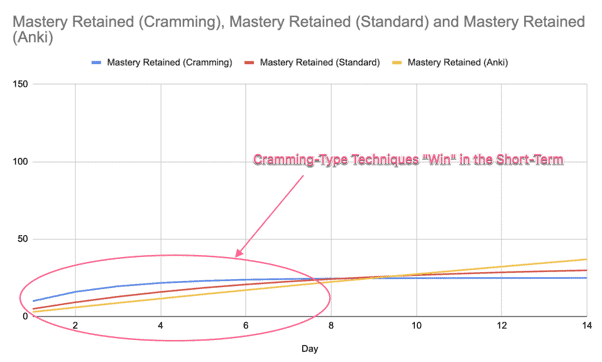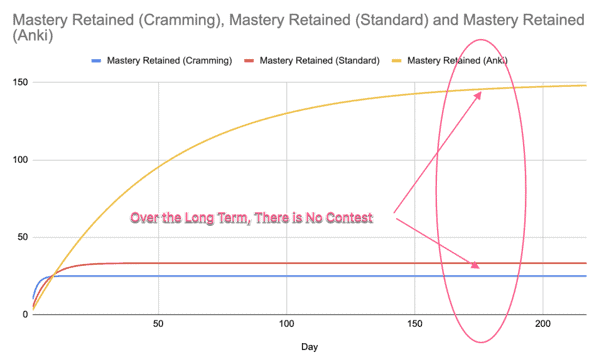
When creating a Step 1 study schedule, we all face the two-rabbit problem. Specifically, if we chase one rabbit, we can catch it. Chase two rabbits, catch neither.
In making a Step 1 study schedule, those two rabbits to chase are either:
- Learn things well and never forget them OR
- Move quickly through the material and be “comprehensive”
Realistically, most people don’t have enough time to learn EVERYTHING well and spend enough time to ensure they don’t forget it. So, try and do both and fail at both. Thus, we must choose one or the other.
In this article we will discuss:
- Why moving faster is the default – and ends up being much slower,
- The importance of learning things well,
- How it’s easier to 10x your knowledge than you think,
- Why being unorthodox in your Step 1 study schedule can be less stressful and more sane, and
- Much more
Integrate and Apply Concepts, Then Never Forget Anything
What would your life be like if you could learn everything well, never forget it, and learn to apply/integrate it on exams and patients? It might seem like a pipe dream, but it’s not.
In fact, it is easier than you think. Yes, studying for the USMLEs is hard and takes a lot of sustained focus, dedication, and hard work. Yes, our results rarely match our expectations and desires. And yes, many days it feels like we fail more than we succeed.
However, no matter how much we may be struggling, Step 1 offers an opportunity to transform your approach to learning so you can:
- Actually understand what we’re studying, rather than memorize it;
- Never forget anything we learn so your knowledge can compound; and
- Learn how to apply it to clinical scenarios to get better test scores and become better doctors
How Important is it to Learn Things Well for Step 1?
Do we really need to understand things for Step 1? Or can we just memorize a bunch of details and get by?
To be brief, on Step 1 understanding is key. That said, it was hard for me to break the habit to memorize. Why? Because most of my tests at Stanford – like at virtually every medical school worldwide – were memorization-heavy.
My classmates could pass their tests by just taking old tests and cramming in the days leading before. This was because professors often recycled the test questions, and the material was presented and tested with memorization as the focus rather than application/integration.
Step 1 was initially a shock, because it was so different from any test I’d ever taken. While I was passing my initial practice tests, they were nothing like my prior med school exams. Instead of being about factual recall, the focus was on the application of concepts. I’d study something for hours and STILL get questions wrong on it, either because I didn’t learn it well or I’d forgotten it in the interim.
The punch-line is that any Step 1 study schedule must give you enough time to learn things well. Memorizing something without being able to use it is a common path to stagnant Step 1 scores.
But understanding is only half of the equation necessary for an effective Step 1 study schedule. The second key ingredient? Retention.
Retention: The Underappreciated Superpower
What would you rather do:
- Cover material 3x faster, OR
- Retain what you’ve learned 20x better?
Theoretically, we would all choose to 20x our retention. Practically, though, this is difficult to actually follow through on. Despite the fact that there is a technique (spaced repetition) that can literally 100x how much you can remember, most people don’t actually follow through on it.
Why Is Retention So Hard?
You’ve probably heard of Anki and/or spaced repetition? It promises to help you never forget something in the most efficient way possible. For example, I study less than an hour per day to remember almost everything I’ve put into Anki cards since 2009.
But if spaced repetition is so powerful, why do most people not take the time to implement it properly? Three reasons stand out:
- There aren’t effective models for how to make cards that aren’t just regurgitation of facts (e.g., Zanki, Brosencephalon, Anking, etc.);
- We’re wired for survival, not success; and
- Learning something new is easier to measure than not forgetting something old
For more on why Med School Anki is so hard to learn but can change your life, click here.
But Why Does Retention Win Out in the End?
Like many things in life, the intuitive answer isn’t always the right one. Such as it is for retention.
Consider, as we have, the situation of cramming vs. spaced repetition. To summarize:
We are learning 10 pages per day in our cramming example, an insane rate. With spaced repetition, we could learn 70% less per day (only 3 pages daily). However, because our retention is 20x better – it’s likely much more than this – the amount we will ultimately know is 6x greater.

Despite giving Cramming and “Standard” unrealistic advantages, spaced repetition dominates the long-term
Spaced Repetition is Slower Initially But Leads to Much Better Outcomes
The surprising finding: despite moving through resources slower, you will still know much more by using spaced repetition due to the immense advantages in retention. In other words, you could cover many fewer UWorld questions daily but come out far ahead by never forgetting what you’d learned from the QBank.
An even more surprising finding? Spaced repetition “wins” after only a week and a half. In other words, if you learned material 70% slower but forgot 20x less, you would end up ahead in less than ten days.

Even by giving cramming unfair advantages – and disadvantaging spaced repetition – cramming still loses by ten days
Everything after that ten-day point would accrue to the spaced repetition approach.

After ten days, spaced repetition beats out cramming handily
In other words, are you struggling to make a Step 1 study schedule that allows for consistent score improvements? If so, look at how much you’re retaining vs. forgetting.
The Unorthodox Step 1 Study Schedule: Cover Less, Learn It Better (and Never Forget It)
So, how do you make a Step 1 Study Schedule that allows you to learn things well, never forget them, and then apply them to your Step 1 questions? By choosing to chase one rabbit. Again, because of limited time, we have to choose either:
- Learn things well and never forget them OR
- Move quickly through the material and be “comprehensive”
Only in my dreams can I cover ten pages of First Aid, do 100 UWorld questions, and still have time for video lectures, all in one day. However, the reality is that our time and attention are limited. Indeed, by trying to learn everything well AND cover all the resources we want, we often do a poor job of both.
Slow Down and Study a Few Systems in Depth
When starting our Step 1 studying, we usually know specific systems better than others. Therefore, our recommendation would be to start with those topics that we are weak on.
For example, I’m weak in cardiology, respiratory, and immunology. I’d start with those systems, maybe spending up to 1-1.5 weeks on each. Assuming a 6-week dedicated study period, I might spend half – or even a bit more – on a handful of systems. Spending more time on those systems gives me a better chance to learn those things well.
Plus, by sticking to subjects within a particular system, I can take advantage of the fact that mastery compounds. By learning things well, I make learning the following related topic that much easier. I just learned about pneumonia and why it can cause hypoxemia because oxygen exchange at the alveoli is impaired. Understanding hypoxemia in the context of (alveolar) pulmonary edema is much easier for me.
With the Remaining Time, Do Mixed Blocks
With the remaining time, I could do mixed blocks for the remaining systems (e.g., neurology, GI, biochemistry/genetics, renal, etc.). That way, I can still cover the highest-yield topics. Plus, if I did an excellent job learning my weakest systems first, it will make it easier to understand the other subjects. For example, by mastering cardiology, any related topic – including the renin-angiotensin-aldosterone-system (RAAS) – is much easier to follow.
Unorthodox Step 1 Study Schedule Example
Here’s an example Step 1 Study Schedule for someone starting in the 170s on their NBMEs might consider if they had 6-8 weeks:
- Week 1: weakest system #1 (e.g., cardiology)
- Week 2: weakest system #2 (e.g., renal)
- Week 3: weakest system #3 (e.g., immunology)
- End of Week 3: another NBME to assess progress
- Week 4-6: mixed blocks for remaining subjects
- End of week 6: another NBME to evaluate progress
With each system, whatever you learn on a particular day, you understand well enough to use it on your exam. Then make sure to use spaced repetition/Anki – and do your cards daily – to ensure you never forget it.
What About the Topics I Haven’t Covered?
But what about all the things that I do NOT master? What if they’re on my test??
Paradoxically, it is an advantage NOT to have covered everything in-depth. Why? Because people are generally bad at predicting how long something will take / how much progress they will make. Practically, studying for Step 1 can take longer (sometimes much longer) than we expect.
(I spoke with someone recently who had been studying for Step 1 for 5+ years and had failed three times. Yikes!).
What happens if we’ve done a pass of UFAP and are not ready? It’s not obvious what we should do to improve more. Do we do another pass? Should we get through a bunch of UWorld questions? Is Zanki the answer?
But what if we cover 1/3 of the material, our scores go up by 30 points, but we still need another 10 points to feel comfortable with passing? The next step is easy. Just keep doing what we did – which we know works – for the next system or two.
It’s odd because years of formal education have conditioned us to cover everything before a test. However, the fact that we have NOT covered everything well gives us ample opportunity for improvement in the future.
Concluding Thoughts: If Topics Were Dollars
A fascinating psychological finding is “loss aversion” – the pain of losing $5 is greater than the pleasure of gaining $5. The estimate is that losses are up to twice as painful as gains are pleasurable.
Oddly enough, the opposite of loss aversion occurs with studying. I’d estimate that we get a much more substantial dopamine spike with learning something new than retaining something old. I’d imagine the dopamine spike is relatively weak with retention since it is so hard to measure, and forgetting (“loss”) isn’t felt acutely.
We can complain about our evolutionary wiring or take advantage of it.
Remember that time scarcity will compel most people to try and cover more and neglect retention. This evolutionary blindspot is a huge opportunity to exploit. The students we work with who learn things well and never forget them reap immense benefits on their exams and the wards.
Consider a consultation if you want to rewire your brain for success – rather than survival. Often the things holding you back aren’t intuitive, and the solution to your struggles may not be obvious. So sign up if you’re wondering why your scores or learning have hit a plateau. You’ll learn more about how you can master things, never forget them, and apply them to clinical scenarios to get higher scores and be a better doctor.







